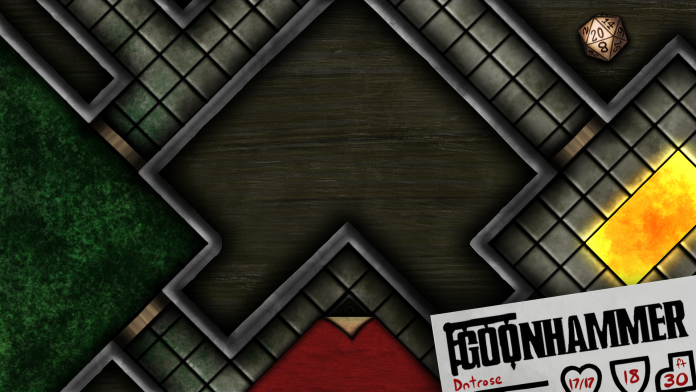Gen Con is a crazy choice for your first convention ever, but I’ve never been one to back down from a challenge. Thanks to folks at Goonhammer approving my press badge and my relative proximity to Indianapolis, it was possible – and my friends even joined me! Along with over 70,000 other nerds, I walked the exhibit hall, attended events (more on those later) and played some games including my first LARP (that’s getting its own article). Every single person I spoke to, on behalf of Goonhammer or on my own, was absolutely lovely.
Something strange kept happening, though: I was looking around and realizing how many in the crowd and on various stages were ostensibly white and male. As a member of both demographics, I’m not always super cognizant of this kind of thing, but it was striking. This is absolutely not to say that I didn’t see anyone outside of those boxes, because of course I did. A lot of folks also wore various pride merch and, looking back, I did see some more diversity in vendors in the exhibit hall, especially in the art section.
People in the tabletop world talk a lot about diversity in gaming, working to remove bigoted ideas from real and fantasy worlds. There are clearly all types of people playing tabletop games (including board games, though I’m focusing on RPGs) because they’re all over the influencer sphere and online space. So why weren’t they at Gen Con?
To some extent, this was a revelation of how much of an echo chamber I must be operating in, or perhaps just of my own naivety. When I call people “chronically online,” I do so with self awareness; I spend objectively too much time thinking about TTRPGs, following news and controversies about them and generally, well, being online. I need to touch grass and I know it. Again, this was my first convention for a variety of reasons, so maybe I just should have known who to expect to see there.
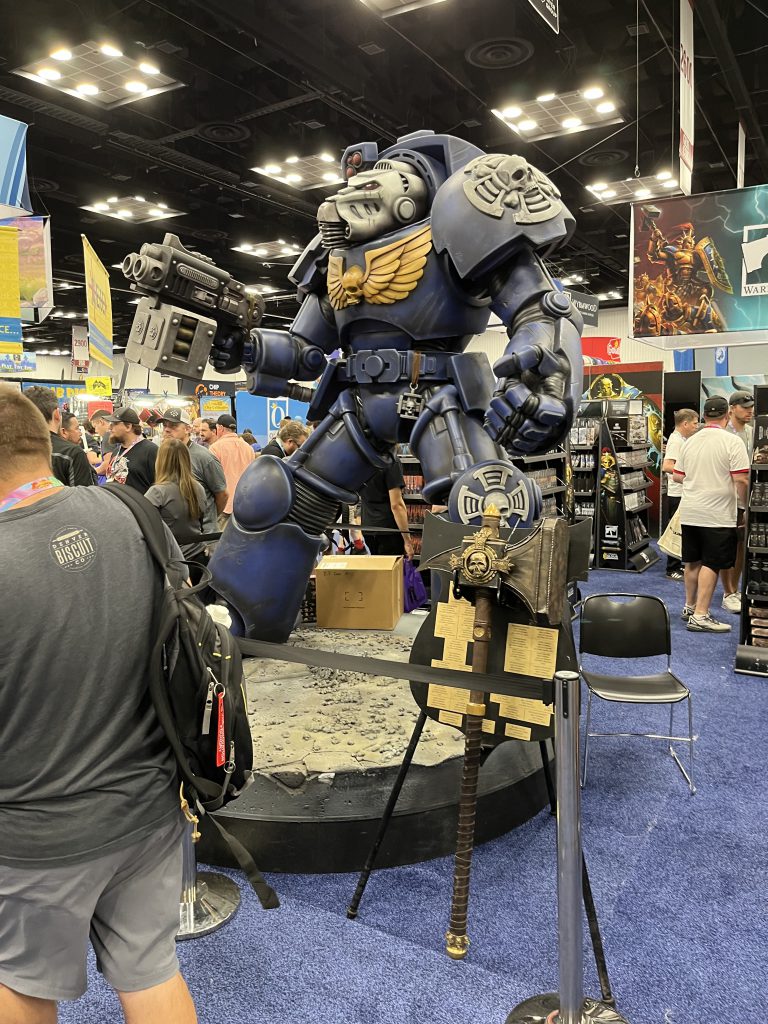
Admittedly, there’s only so much you can do to encourage women and people of color to attend your con for a historically white male hobby. People are concerned about their safety and being able to make friends. Gen Con did host a handful of panels and events highlighting women, nonbinary people, neurodiversity, mental health and general diversity, though obviously most events had nothing to do with attendees’ identities. The events I attended (sadly few as I prioritized press engagements, food and sleep) mostly featured white people. Also worth mentioning: ASL interpreters were rare from what I saw.
From comments made by event organizers and from a quick look at the Gen Con event submission info, I don’t think the convention had anything to do with casting events. Also, as a person with common sense, I don’t think that organizers were rejecting events that highlight underrepresented groups. What I’m highlighting here is not a condemnation of Gen Con but that it serves as a microcosm of the larger community, revealing things I thought were no longer necessarily true.
In a similar vein, people were… not masking. I’m definitely not as cautious about COVID as I should be, but looking at photos of crowds from previous conventions made me immediately decide to mask up and my friends totally agreed. We masked nearly everywhere, but especially in the hallways and exhibit hall as people pressed close together. Far be it from me to guilt anyone for not doing so (again, I’m not good about it in my daily life), but it’s a good reason for people to be cautious about attendance. And sure enough, I’ve already heard about many people catching the virus during the convention. I’ve tested negative but am still on the lookout for symptoms and crossing my fingers.
This is something that Gen Con organizers could have changed, if they chose to, but I understand why they didn’t. Many conventions have dropped masking policies and it’s getting harder to understand COVID trends as cases aren’t being tracked. However, it is still the case that events like this one are notorious for spreading illness.
Throughout the weekend, I kept thinking of all the people I consider “chronically online” when it comes to TTRPGs. They might analyze games in a way that implies they rarely play them or argue over minutiae or just generally make it apparent they haven’t interacted with TTRPGs in any offline space. The fact that I’m writing something like this probably automatically puts me in that camp in many aspects.
Many people at Gen Con seemed of the opposite variety, loving D&D and Wizards of the Coast fairly uncritically. Now, that’s pretty uncharitable and I know it. The way I engage with most entertainment is annoying, and everyone is tired of listening to my media analysis. Most people want to play their games and have a good time and probably never go much beyond Googling some rules. And why would they? That’s all they need to do to be fans of these games, and I frequently wish I, too, could like things at a normal level. There is also a sliding scale of how much people analyze or don’t analyze, engage online or don’t engage, and I shouldn’t dichotomize the community.
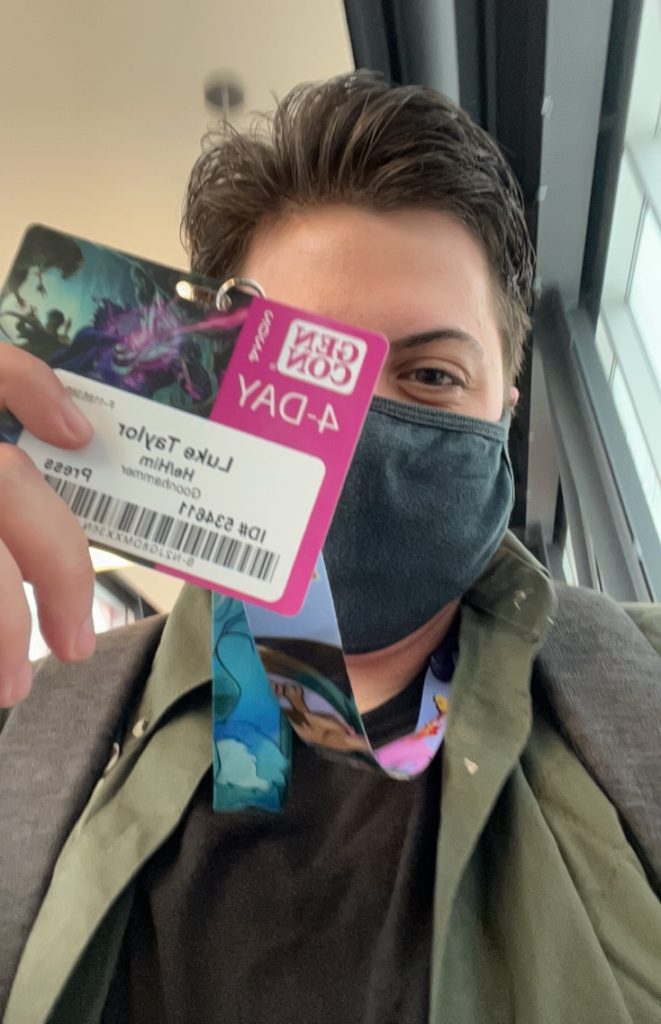
So, what is causing the difference between the online echo chambers and people who come to conventions? There’s a fair amount of overlap, surely, and both camps share a love for the very same games.
I posit that many people are engaging with these games exclusively online and developing these odd little pockets of “chronically online” behavior because they don’t see the space for themselves at in-person events. It’s a lot easier to protect yourself from general toxicity or outright discrimination online with a simple block button. What can we, as convention organizers and a community as a whole, be doing to not only provide that space but highlight it? Am I the only one seeing this as a problem? Have all conventions been like this forever, and it just doesn’t matter?
Maybe I see it this way because of my own journey: a few short years ago, before coming out as trans and seeing hormones do their work, it was harder for me to engage in real-life hobby spaces. There really was no way around getting misgendered all the time, even if most people didn’t have any ill intent. I’d be othered in a million tiny ways resulting in a bad experience. Now that I tend to automatically be sorted to the “male” category alongside “white,” that friction has eased. If that isn’t an illustration of privilege, I don’t know what is.
The thing is that I was excited to go to my first convention in part as a chance to get offline, and I want more people to be able to do the same. Meeting people in real life, playing games or starting conversations with strangers face-to-face is the way to build community and make the hobby better. You can do a lot of that online too, but it’s simply the case that algorithms and advertisers feed on negativity.
I had the absolute time of my life this past weekend. Was that, in part, because I am the kind of person who is allowed to? It sounds silly to ask whether “having a good time” is a sign of privilege, but looking around the attendees and entertainers, it was hard to think otherwise.
What I was hoping to see at Gen Con was an effort to ease that friction. I think most people, chronically online or not, are somewhat aware of the history of discrimination in the TTRPG hobby space, and this is far from the only nerd culture to be reckoning with that kind of thing. I’d like to see Gen Con continue to put more of an emphasis on diversifying the hobby, if there’s a way to do so. More events by women and people of color would be great to see — could they specifically put out the call for those groups to work with the con?
I’d also encourage people who want to go to this kind of event to give it a try. Seriously, everyone I interacted with was incredibly nice and the logistical side of the convention was remarkably smooth. Everyone who loves tabletop games deserves to play them and connect with others who do so. It’s never great to have to make a space for yourself, but I genuinely believe that Gen Con is ready for that shift. We all need to get a little less online, and I hope conventions like this one can become safe and welcoming enough to create opportunities to do so.
Okay, I’ve said my piece and I keep talking about how I really did have a great time; let’s get into the few events I managed to attend at Gen Con! The good, the okay, and the… hm. Well.
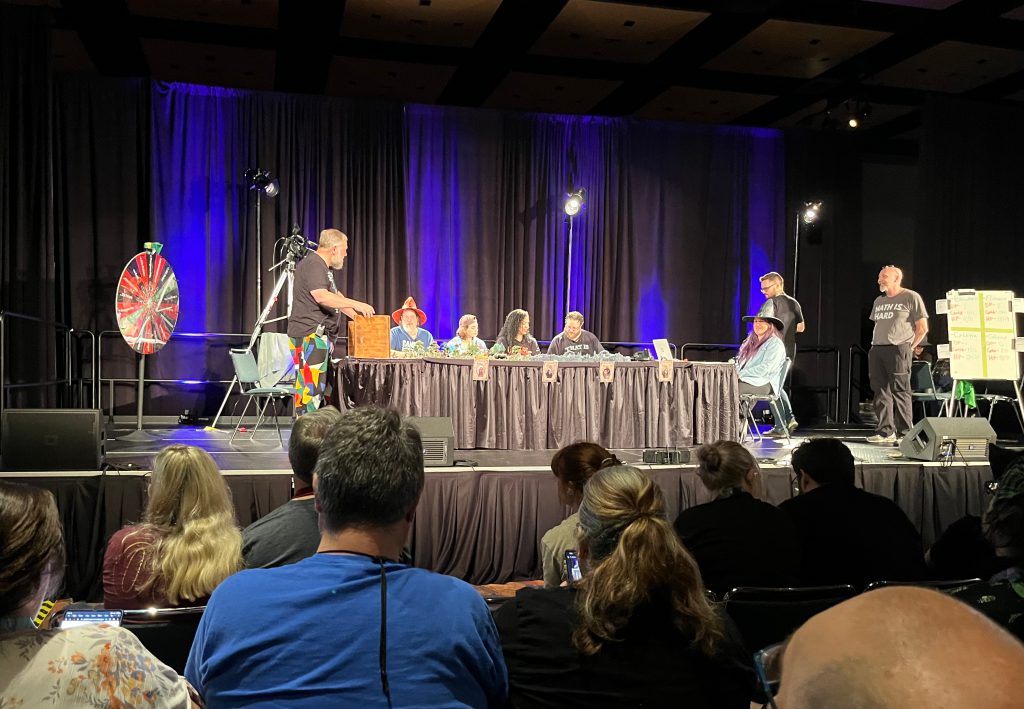
The Great Gooey Dungeon Game Show: Sorry, We’re Cheering for Gary Gygax?
This isn’t the kind of thing I’d normally go for, but my friends were interested and, picturing some kind of D&D trivia thing where I could finally use all of this useful rules knowledge, I happily agreed to go. This was an incorrect assumption of what the event was; it was people playing something you could call D&D, with choices frequently voted on by their section of the audience.
This isn’t an unheard of concept and it’s conceptually fun, but the players really didn’t have a chance to roleplay, make interesting choices or do anything else that makes actual plays fun to watch. The audience voted on which path they each took, and those paths each led to predetermined results no matter what the player did on the way. Also, the hosts’ absolute insistence on making meta jokes and speaking more than the players left no available time.
That sounds like a pretty scathing review, but I wasn’t having a bad time. People were engaged and I cheered along with the rest. This was not my kind of event. It was fine. I haven’t gotten to the weird part.
Luke Gygax, son of D&D creator Gary Gygax, was part of the event alongside his wife Bouchra and child whose name I did not catch. (Sorry! She was also a teenager and thus nothing I have to say is directed at her.) This year marks D&D’s 50th anniversary, so why I personally don’t understand venerating the family of someone famous, I imagine they filled in to celebrate in Gary’s place throughout the weekend.
The really weird part was that the event hosts brought out a portrait of Gary as well as a portrait of Gary as a ghost to give to audience members. The crowd went wild. I may have said, “What the fuck?” aloud. It’s pretty strange to give away a portrait of a dead guy as a ghost, but the family didn’t seem bothered so I may be overthinking.
This was one of the first places I noticed what I mean about people at the con not seeming engaged with critique of their games, even the most basic “separate the art from the artist” kind of problems. Obviously, I don’t know what was in the minds of anyone in that crowd, but I could only imagine feeling strange owning a portrait of Gygax, a man I tend to associate with rampant sexism and pretty racist worldbuilding. This is also a place I see the need to find the balance between “chronically online” and “offline.” I probably sound like a sensitive SJW (hey, remember when people used to say “SJW”?) for describing Gygax that way. On the other hand, I think anyone who plays D&D should be at least loosely aware that some bigoted ideals are baked into the game.
Boston: Besieged (World of Darkness LARP): Uh oh, I’m more of a nerd than before.
I’ll be writing something separate on my first experience LARPing. It was the same and different from my usual TTRPG experiences, it was amazing and WoD might be better for LARP than tabletop. We did all sorts of wild things ranging from slapstick comedy to intense drama, but the real highlight was how well the organizers and storytellers from City of Glass Games managed the event. I can’t stop thinking about all of it.
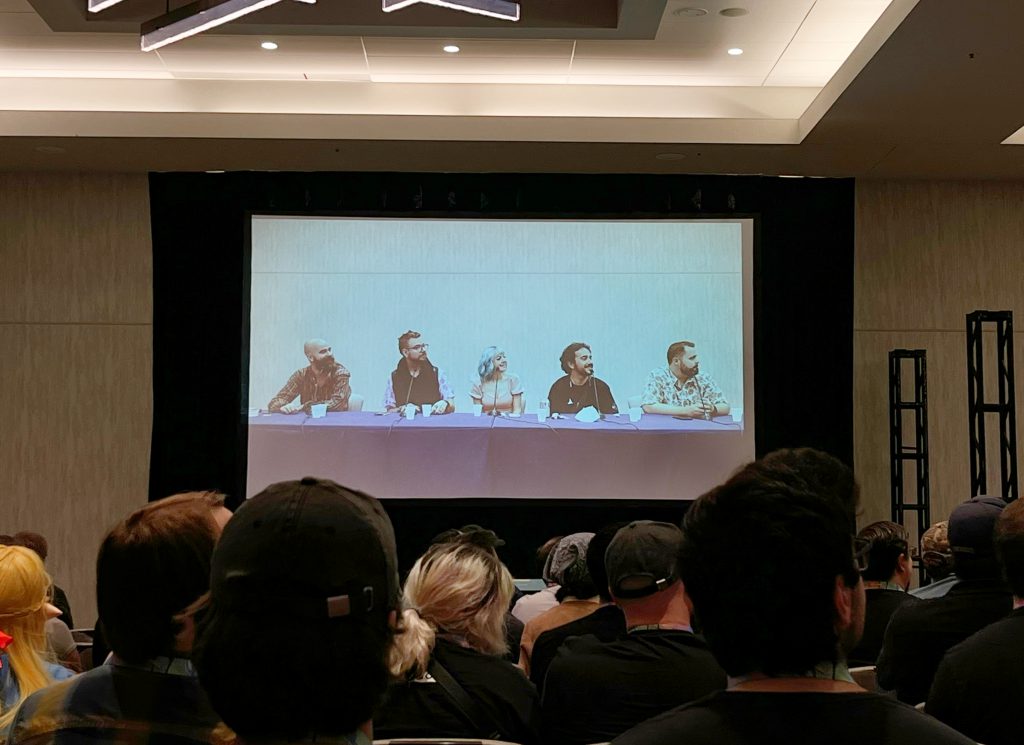
Q&A with Ginny Di, Pointy Hat, DnD Shorts & The Dungeon Dudes: Wait, are influencers online or offline?
If you don’t recognize these names, they’re all D&D content creators who primarily post on YouTube. I’ve seen a few of each of their videos and they all seem like good people who are good at what they do. I’ll highlight Pointy Hat for making lots of fun homebrew which he puts out for free and Ginny Di for her cool costumes and characters, as well as her determination to make a space for women in D&D; I’m less familiar with the other two channels. This was another event my friends wanted to see and I thought sounded fun.
It was fun! The creators are all charismatic and had a good time riffing with each other off of audience questions. As is typical with panels, their answers went on too long and we ran out of time, but that’s all part of the fun and they did a nice job.
Unfortunately, they completely floundered on the second question out the gate. My new personal hero, an audience member, got right up there to ask about these creators’ opinions on Wizards of the Coast. All of the YouTubers pushed back on WOTC during the Open Gaming License scandal; a few years back, WOTC had plans to change the license in a way which would make it harder for independent creators and publishers to put out supplemental D&D material. Everybody got very mad about it, and WOTC took it back.
Anyway, this audience member asked the creators how they felt about that today, as well as about some controversies I’m less familiar with, like how WOTC has handled leaked Magic: the Gathering cards.
All five people on the panel (there are two Dungeon Dudes) looked nervous. To their credit, each gave an answer, but those answers did not seem prepared.
DnD Shorts said that a lot of people who work at WOTC are great and “on our side” which was just fascinating phrasing. On whose side against what? Ginny Di celebrated the results of the OGL pushback and said that we should continue encouraging companies to make ethical decisions and that “the fact that we were D&D customers is what gave us that power and forced change to happen.”
One of the Dungeon Dudes went with “there is no ethical consumption under capitalism,” adding a nail to the coffin of that phrase’s usefulness in modern discourse. He did advocate for purchasing from your LGS so a lot of the profit goes to them, which I would agree with if you must purchase official D&D content. “I don’t want to be afraid to love Dungeons and Dragons for the rest of my life,” he said.
It’s clearly difficult for these people to pull away from the game they built their platforms on. I get it, I still love and play D&D myself. However, you simply have to be prepared to defend yourself if you have chosen to engage with WOTC or D&D. Mainly, I wish the format would’ve allowed for some follow-up questions.
This was followed by a solid dose of good advice for running TTRPGs, lots of silly commentary on the hottest monsters and generally a good panel, but the fact that these creators seem unaware that audiences may still take issue with the brand they support was disappointing. If anyone was going to be “too online” and tuned into that sort of thing, I would have expected it to be them. Still, I can’t blame them for not expecting a hard-hitting question and I enjoyed listening to a lot of their thoughts on content creation as well.
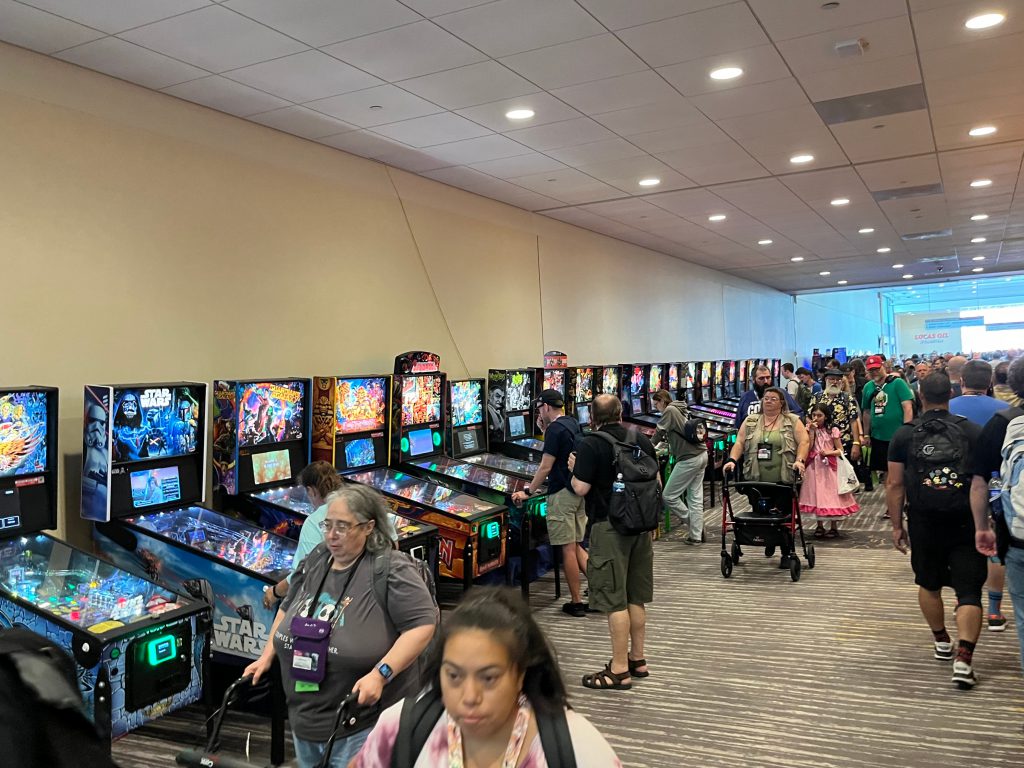
D20 Burlesque’s Nerdlesque Extravaganza: … Okay!
I caught the second half of the performance after a LARP night and frankly don’t have much to say about it. I did affirm my suspicion that I’m really not interested in burlesque and similar shows but that has nothing to do with this particular event. The costumes were cool and people chose funny characters to perform as. This was the only really diverse cast I witnessed. The ASL interpreters seemed to be doing a great job. People loved it, my friend enthusiastically proclaimed “butts!” and the people I was with plan to go back next year.
Reading and Writing in a Neurodiverse Universe: Good advice for the target audience!
I planned to attend three sessions in the Writer’s Symposium and only made it to this one since I was busy chatting with game designers. On my third day at the convention, the subdued panel was tough to focus on but rather relaxing. I apologize to the hosts and attendees for the giggling and fidgeting when me and a friend arrived, we were beyond slaphappy at this point!
For someone who is not planning to write a book, this wasn’t the most applicable panel, but the authors involved shared some really good advice for people with ADHD and autism to get their work done without burning out.
An audience member asked about finding time to write alongside a full-time job, and one panelist’s suggestion to stop thinking about writing as something you need to sit down and do for a few hours. Their point was that 15 minutes of writing maybe 250 words a day will get you a book in a year, but I thought this mindset shift was a good recommendation to anyone trying to fit an art or hobby into their schedule. They also spoke about encouraging neurodiversity in literature, which was nice, as were their personal accounts of seeking out neurodiverse characters as children.
The writers’ symposium panels were all very well-attended, from what I could tell. Many seemed to be intended for people writing books, rather than something directly related to gaming, but my friends really enjoyed a session on “writing a rules-lite TTRPG.” I don’t see myself attending many of these panels in the future (unless I lose my mind and decide to write a book), but this one was well done.
Yazeba’s Summer Adventure: This is what I should have been doing all weekend.
To close out our ticketed events, my group joined a table to try out “Yazeba’s Bed & Breakfast.” I’ve heard a lot about this TTRPG but considered it low priority as “cozy games” are really not my style. It turned out to be an absolute blast! It’s perfect for convention play since all the characters are pre-generated and the “living document” quality means you get to pick up with fun and confusing notes from previous groups. Flipping through the “guest book” to see how many people played the same characters I did was really neat.
Yazeba’s is supposed to be GM-less, but we had one anyway; he explained the game and then mostly served as an adjudicator to make sure everyone got equal playing time. This was great, especially since not all of us players knew each other. I played as a little frog who was once a prince and then as the Lady of the Lake as we cooked up a big breakfast and went fishing. Our GM said there are some more serious or heavy chapters to play, but he thought those would be more fun for a group who had gotten familiar with and played more of the characters. This was the right call, especially after an exhausting weekend running around. We had some funny and sweet moments and got a better understanding of the game for a ticket cost of maybe $4. What more could you ask for?
I may write a full review on this game once I sit down and read the book, but for now I’ll say the mechanics work much better than I would’ve expected and that it’s a great choice if you want a game you can easily pick up and set down on any schedule. It’s a rare game where the incentives to make mistakes in character actually work; you can’t win any of the mini games that form the chapters without earning tokens with “whoopsies.”
Next year, I intend to put more time into playing games I’ve been interested in or playtesting new ones. It’s a lot easier to learn games with a GM who already knows them, and in retrospect I missed out on opportunities to do so. I also have a lot of respect for the people willing to GM for several random tables of players across a few days; that sounds pretty stressful, but ours did a great job. Wow, it turns out that playing games is more fun than talking about them!
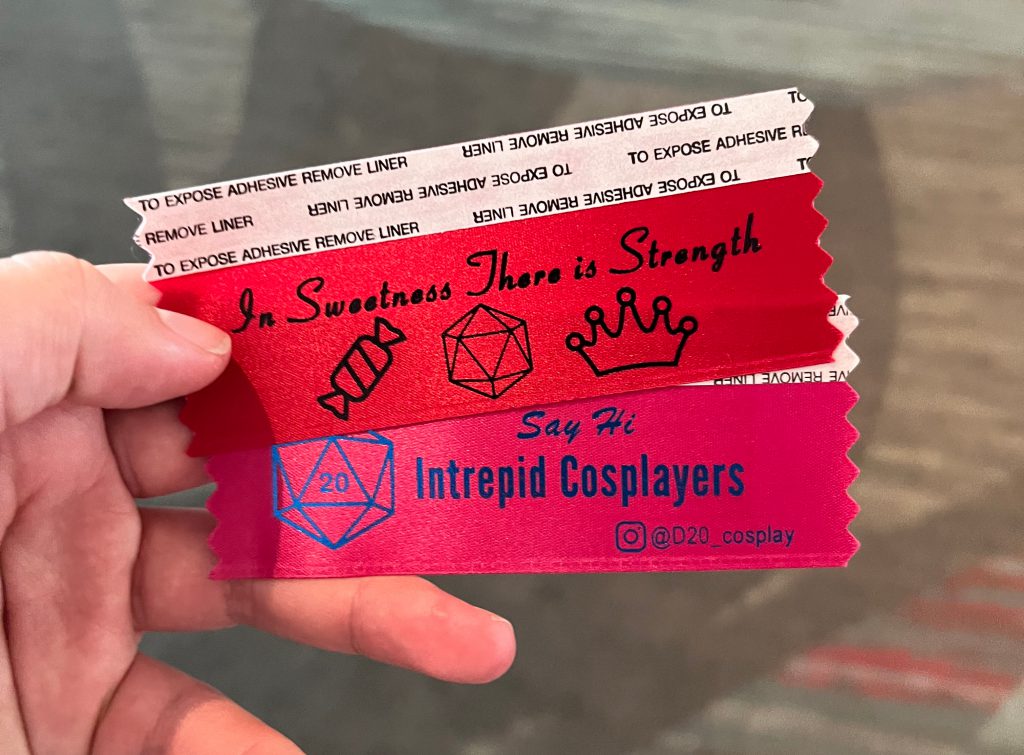
The Convention Floor and More
Despite this massive convention spanning multiple buildings, it wasn’t too hard to find our way around and move quickly. There wasn’t a lot of visible security, which felt concerning, but it turned out fine. This is very specific, but I was so impressed that I started complementing random employees: the “will call” ticket line was so well-organized that they moved at least 100 people through in less than five minutes. One worker told me they had been keeping that pace up all weekend. It was always easy to hand over tickets or scan your badge to get into events and the only traffic jams I saw were in the exhibit hall, which probably can’t be helped.
The exhibit hall was completely overwhelming in a way I ended up enjoying – we visited any time we had a gap between sessions and never ran out of cool things to look at. I’ll probably spend more money next year; I only picked up one art print and a solo TTRPG. We also bumped into a few artists I recognized from social media, so it was cool to compliment their work in person.
Gen Con isn’t a huge cosplay convention due to strict rules surrounding props (which make sense given the number of attendees) but we still saw many cool costumes. Highlights for me were from actual plays (Ruby Rocks and Primsy Coldbottle from “Dimension 20: A Crown of Candy” and Moonshine Cybin from “Not Another D&D Podcast”), several “Legend of Zelda: Tears of the Kingdom” characters and of course all of the “Baldur’s Gate III” characters. I don’t watch a lot of anime or “Hazbin Hotel” so many were confusing. Also, is “Homestuck” finally old news? I only saw one gray dude with horns.
Final Thoughts
I’m coming down on diversity and inclusion so hard because I was taken aback at what felt like a very homogenous crowd at the convention. Whether this comes down to misplaced expectations or what, this was genuinely something that was in the back of my mind throughout the weekend. I have such a love for TTRPGs and the community and I only want to see it keep getting better; in my opinion, making sure in-person and online spaces are both welcoming to all is a big part of that. In other words: I want more people to play games with!
I absolutely plan to attend Gen Con again next year if possible. As a whole, it was less overwhelming than I feared and I imagine it’ll be even more fun now that I have a better idea what I care to participate in. (LARP, for one thing. I can’t emphasize enough how much fun it was.) A million little things that would make this even longer than it is, from casual conversations in line for food to watching people paint minis, made the weekend super fun.
One of the coolest things about the event as a whole was just meeting and talking to people for real. There were artists I like, game designers I like and more just enjoying the con or promoting their work. I don’t know if you can call it networking, but seeing people face to face and chatting about what they do will always be worth it.
Next year, maybe I’ll cosplay. Taking suggestions for characters starting now.
Have any questions or feedback? Drop us a note in the comments below or email us at contact@goonhammer.com. Want articles like this linked in your inbox every Monday morning? Sign up for our newsletter. And don’t forget that you can support us on Patreon for backer rewards like early video content, Administratum access, an ad-free experience on our website and more.
